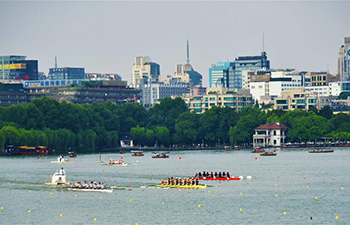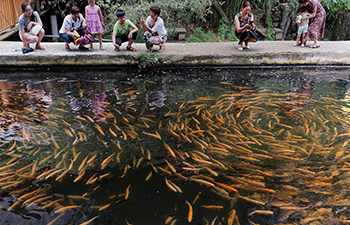DAR ES SALAAM, July 22 (Xinhua) -- Tanzania's imminent plan to ban use of plastic bags sparked a heated public debate on Saturday with some people supporting the ban and others rejecting it.
The discussion hosted in Dar es Salaam by the Vice-President's Office that oversees the environment docket was aimed at collecting views from the public on the impending ban on the use of plastic bans according to environmental laws.
Shortly after the discussions were opened by January Makamba, Minister of State in the Vice-President's Office responsible for Union and Environment Affairs, Tanzania Plastic Manufacturers Association (PMAT) said instead of banning the use of plastic bags the government should control the use of the bags.
PMAT chairman Joseph Wasonga said the association has submitted eight recommendations to the government requesting it to allow them to continue producing plastic bags with strong environmental protection controls, including recycling them after use.
Wasonga said the government should control imports of plastic bags which accounted for 70 percent of the market, hugely contributing to environmental pollution because they were substandard.
"The solution to this environmental problem is to produce bio-degradable plastic bags which are environmentally friendly," he suggested.
He said many countries in the word such as the United Arab Emirates have begun to enact laws that forced industrialists to start using raw materials that make bio-degradable plastic bags.
"We ask our government to imitate this example by asking every factory to use the same raw materials," said Wasonga.
He said if the ban on plastic bags was enforced the government will lose revenues because the association paid more than 23 million U.S. dollars in terms of annual taxes.
Wasonga added that PMAT employed about 6,000 Tanzanians, who were likely to lose jobs if business was shut down.
He said if the government went ahead with its resolve to ban the plastic bags manufacturers were likely to lose about 50 million dollars invested in a number of factories as most of the money was secured from bank loans.
On the other hand, Jumanne Mgoga, Chairman of the Union for Production of Alternative Bags, supported the government's decision saying plastic bags were hazardous to the environment and human health.
Mgoga appealed for stronger cooperation with the government to eliminate the risks posed by plastic bags.
"There is a need to change direction in order to save people's lives and to protect the environment," said Mgoga.
Said Mgoye, Secretary of the Association of Alternative Bags, said the use of plastic bags must be banned to protect both the environment and people's health.
Mgoye said available data showed that in 2050 there will be more plastic bags in the sea than fish, calling for serious actions to address the problem.
In August last year the government issued a notice of intention to impose a total ban on plastic bags by January 1 this year.
The notice said the government provided a four-month grace period to owners of plastic bags manufacturing factories to take specific steps by investing in an alternative bags and plastic waste recycling facilities.
In April, this year, Makamba told the National Assembly that the government would impose a total ban on plastic bags business by January, next year.
Plastic bags and sachets have for years been used for packing water, alcohol and other products.
The notice said inability of plastic bags to decompose affects soil quality, litters various parts of the country and contribute to the blockage of sewerage and drainage infrastructure.

















